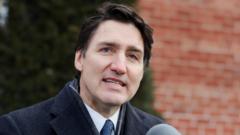Canadian Prime Minister Justin Trudeau has firmly rebuffed Donald Trump’s recent suggestion that Canada should merge into the United States, declaring, “not a snowball's chance in hell” for such an occurrence. This statement comes in the wake of Trump’s comments regarding the potential for Canada to be the 51st state, made during a press conference at his Mar-a-Lago residence.
Trump has voiced his thoughts on removing "artificially drawn lines" between the two nations and stressed that such a move could provide significant national security benefits. He has further threatened to impose substantial tariffs on Canadian goods unless decisive actions are taken to enhance security at the US-Canada border.
Trudeau's response comes at a critical time as he faces political challenges, having announced his resignation earlier this week while planning to stay in office until the Liberal Party chooses a new leader. Currently, Canadian Parliament is prorogued until late March to facilitate this leadership transition. Economists warn that if Trump enacts tariffs after his inauguration on January 20, it could have a detrimental impact on the Canadian economy, with trade amounting to nearly C$3.6 billion ($2.5 billion) passing over the border daily.
In light of Trump's threats, the Trudeau government is contemplating implementing counter-tariffs. Trudeau emphasized on social media that "workers and communities in both our countries benefit from being each other's biggest trading and security partner,” reinforcing the significance of the existing relationship.
As Trump reiterated his anxieties regarding drug trafficking across borders, it was noted that fentanyl seizures at the US-Canada boundary were significantly lower compared to the US-Mexico border. In an effort to address security concerns, Canada has promised new measures, including heightened surveillance and the establishment of a joint strike force to combat organized crime.
Although Trump stated military intervention was not an option in the discourse about Canada, he questioned Canada’s military spending, which currently stands at approximately C$27 billion ($19.8 billion). The Liberal government has committed to increase military expenditures to nearly C$50 billion by 2030, a response to NATO obligations.
Provincial leaders are already mobilizing against potential tariffs, with British Columbia Premier David Eby announcing plans for provincial premiers to visit Washington, D.C. Ontario's Doug Ford expressed that Trudeau should focus on uniting provinces to confront Trump’s threats quickly. Emphasizing the deep interdependence of Ontario's economy with the U.S., Ford remarked, “We keep the lights on to a million and a half homes and businesses in the US.”
As tensions mount, Ford humorously countered Trump's statehood proposal, suggesting a creative alternative where Canada might "buy Alaska" as part of an amicable trade-off. As Canada navigates this politically charged atmosphere, a collaborative response appears critical for maintaining the vital cross-border ties.



















